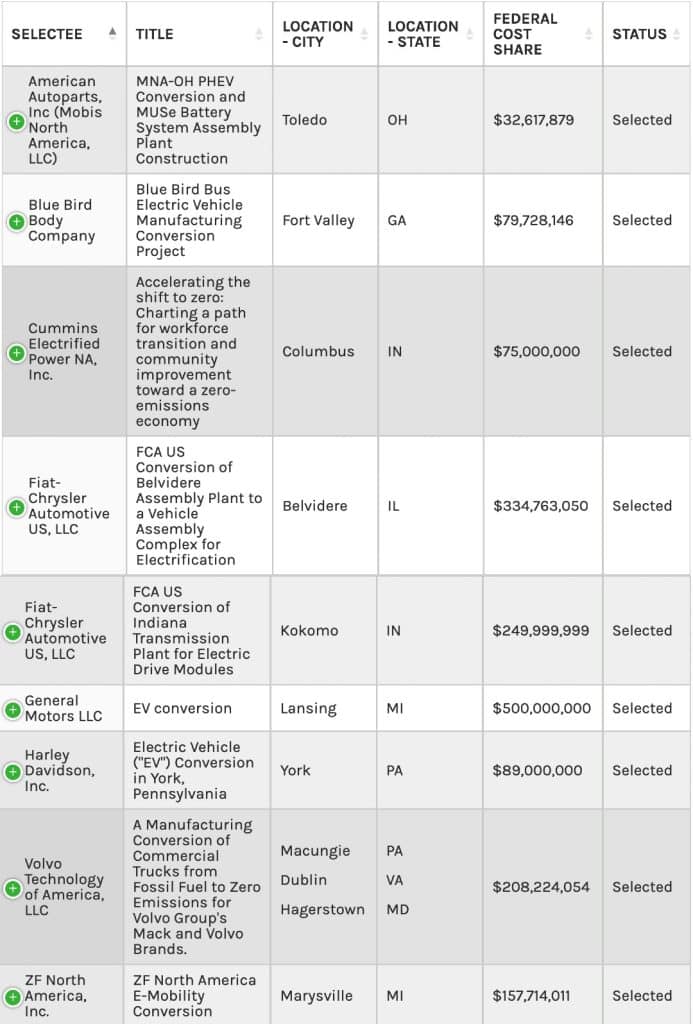- 🚗 GM and Stellantis will receive over $1 billion from the Biden administration for electric vehicle projects.
- 🏭 Specific allocations include $500 million for GM’s Michigan plant, $334.8 million for Stellantis’ Illinois facility, and $250 million for a new EV plant in Indiana.
- 🇺🇸 The funds are part of a $1.7 billion federal investment in EV initiatives across eight states.
- 🛠️ The projects will create over 2,900 jobs and retain 15,000 skilled union workers.
- 📉 The grants aim to help automakers transition from combustion engines to electric vehicles.
- 🌍 Funding is sourced from the Inflation Reduction Act and supports various EV types, including hybrids and hydrogen fuel cell vehicles.
- 🔧 Energy Secretary Jennifer Granholm emphasized the grants help US automakers stay competitive globally.
- 💬 John Podesta highlighted the grants as advancing Biden’s vision of a clean energy economy.
- 🌱 President Biden remarked on the mutual benefits for union workers and automakers in building a clean energy economy.
The Biden administration has announced a significant financial commitment to electric vehicle (EV) projects, earmarking over $1 billion for automakers General Motors (GM) and Stellantis. This move, part of a larger $1.7 billion federal investment in EV initiatives, aims to advance the electric vehicle industry, create jobs, and keep American automakers competitive on the global stage.
Setting the Stage
The Biden administration’s efforts to bolster the electric vehicle industry are taking concrete shape with a substantial financial push. General Motors (GM) and Stellantis are set to receive over $1 billion in federal grants to accelerate their electric vehicle projects. This funding is part of a broader $1.7 billion EV initiative spanning eight states.
Strategic Financial Allocation
Breakdown of the Grants
- GM’s Plant in Michigan: Receives $500 million for the Lansing Grand River Assembly plant, a significant nod to the state’s historical association with automotive manufacturing.
- Stellantis’ Illinois Facility: Gains $334.8 million for the Belvidere Assembly plant, supporting the ongoing shift towards electric vehicle production.
- Stellantis’ Planned Indiana Plant: Receives $250 million for a new EV drive module plant in Indiana, aimed at ramping up future production capacities.

Economic Impact
Job Creation and Retention
The grants are expected to:
- Create Over 2,900 Jobs: New opportunities primarily in manufacturing, research and development, and support services.
- Retain 15,000 Union Workers: Ensuring continued employment for skilled workers in the automotive industry, while fostering job security amidst the transition from combustion engines to electric vehicles.
Supporting Policies and Legislation
Role of the Inflation Reduction Act
The Inflation Reduction Act funds these grants and encompasses several key objectives:
- Incentivizing EV Production: Encouraging automakers to switch from combustion-powered vehicles to electric and hybrid models.
- Supporting Various EV Types: Including hybrid vehicles, plug-in hybrids, and hydrogen fuel cell vehicles, diversifying the EV landscape.
Competitive Edge
Statements from Key Figures
Energy Secretary Jennifer Granholm highlighted the importance of these grants in maintaining the U.S. automakers’ competitive edge against international rivals. She noted, “There is nothing harder to a manufacturing community than to lose jobs to foreign competition and a changing industry.”
John Podesta, Senior Advisor to the President for International Climate Policy, emphasized the broader vision of building a clean energy economy, stating, “President Biden set out to build a clean energy economy that benefits everyone. Today’s awards from the Department of Energy help bring that vision to life.”
President Biden shared his optimism, stressing the mutual benefits, “Building a clean energy economy can and should be a win-win for union autoworkers and automakers.”
Conclusion: A Win for Everyone
The Biden administration’s investment is a decisive step toward a cleaner, more sustainable future. By supporting GM and Stellantis financially, the government is not only fostering innovation but also ensuring that American workers remain at the forefront of this transformative industry shift. These projects are poised to create jobs, preserve existing ones, and pave the way for a robust and competitive electric vehicle market in the United States.





